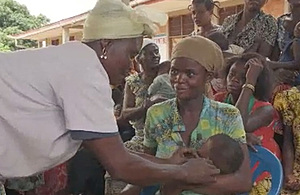UK calls for ‘long term’ approach to prepare for future pandemics at World Bank meeting
UK support to World Bank will help build more resilient economies in the developing world and support the global economic recovery

UK calls for ‘long term’ approach to prepare for future pandemics at World Bank meeting
- International Development Secretary Anne-Marie Trevelyan calls for ‘long-term’ approach to tackling disease outbreaks at World Bank Meetings
- UK support to World Bank will help build more resilient economies in the developing world and support the global economic recovery
- Welcoming the landmark G20 debt relief package for developing countries, Ms Trevelyan highlighted how it will help focus spending to end the pandemic sooner
The World Bank must help developing countries build stronger economies and healthcare systems – leaving them better able to deal with future disease outbreaks and protecting the UK from new infections, International Development Secretary Anne-Marie Trevelyan said today (Friday, 17 April) at the Bank’s Spring Meetings.
Ms Trevelyan, the UK Governor to the Bank, warned it was also necessary to think longer-term – and with greater international co-operation – to make sure more countries are able to fight against future pandemics in order to protect the world from more deadly outbreaks.
Health experts have warned that if coronavirus is left to spread in developing countries, this could lead to a second wave of the virus in the UK later in the year, putting further pressure on our NHS.
Relieving the debt burden to tackle the pandemic
Low-income economies spend on average around 10% of their government revenues on interest payments, with many countries spending far more, such as Ghana where the figure is closer to 40% - far more than they often can spend on healthcare.
A G20 agreement this week to pause $12 billion worth of debt repayments for the poorest countries means some of this money can now be channelled towards helping them deal with the impacts of the pandemic. This will reduce the risk of a second wave of infections, including to the UK, and help manage the impact of a global economic downturn.
Statement to the World Bank
In her World Bank Governor’s statement, co-authored with Chancellor of the Exchequer Rishi Sunak, Ms Trevelyan called for the World Bank to help the poorest countries “build back better,” making them more resilient and better able to deal with future crises which would help protect the whole world.
She added: “The World Bank Group should ensure that any post crisis recovery builds resilience to natural disasters, climate change, threats to the environment and biodiversity; supports investment in long term and low carbon sustainable development, green jobs and green energy, and responds to other economic vulnerabilities.
“The support provided to health systems must leave a legacy of strengthened global health security so that we are better prepared for the next pandemic.”
Speaking at the World Bank Meetings, held virtually today because of the pandemic, she repeated the need to plan for the future. She spoke of the importance of getting children back into school, saying the disease was “creating an education emergency that could have devastating impacts on girls in the poorest countries of the world”.
Ms Trevelyan welcomed the $160 billion funding package agreed last month by the World Bank to help developing countries fight and recover from the pandemic and its economic impacts, also aiding the whole world economy.
On this week’s G20 debt relief package and the World Bank’s financial support she said: “No-one is safe until we are all safe. We must now all use this firepower to address the health and economic challenges ahead. We should deploy this firepower effectively, to make the tough choices and target the resources to the most vulnerable countries and people and especially, to women and girls.”
Yesterday (Thursday, April 16), the Chancellor reiterated the Government’s commitment to help the world’s poorest countries recover from the outbreak - doubling the UK’s £2.2 billion loan to the IMF’s Poverty Reduction and Growth Trust, allowing it to expand support for low-income countries.
Notes to editors:
-
On 15 April the Chancellor Rishi Sunak agreed an economic action plan with global counterparts to tackle the world-wide outbreak of coronavirus.
-
The UK announced up to £150 million of funding for the IMF’s Catastrophe Containment and Relief Trust in March 2020. The IMF Board approved the first tranche of support through the CCRT on Monday 13 April
General media queries (24 hours)
Email mediateam@dfid.gov.uk
Telephone 020 7023 0600
If you have an urgent media query, please email the DFID Media Team on mediateam@dfid.gov.uk in the first instance and we will respond as soon as possible.